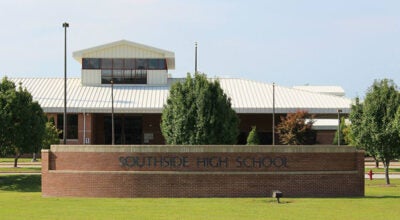House Republicans: Budget emphasizes veteran teacher pay
Published 4:01 pm Wednesday, May 1, 2019
By GARY D. ROBERTSON
Associated Press
RALEIGH — North Carolina House Republicans rolled out nearly all of their proposed state government budget for the next two years Tuesday, saying the proposal will build up veteran teacher pay, recruit new teachers and address more school safety needs.
The GOP plan would spend $23.9 billion in the fiscal year starting July 1, which is 3% higher than current-year spending, according to the General Assembly nonpartisan fiscal staff.
Separate from that dollar amount is hundreds of millions of dollars for state building repairs and construction. Republicans are proposing a small personal income tax cut and some business tax reductions, spread out over several years. They’d also attempt to collect more sales taxes from consumers buying online.
“We’re spending responsibly, saving wisely and we’re putting as much of the funding growth into education as we can,” said Rep. Donny Lambeth, a Forsyth County Republican and a House Appropriations Committee senior chairman.
The proposal, which cleared one House committee earlier Tuesday and heads to another Wednesday, also distributes more money already set aside last year to address Hurricane Florence recovery and begins to build back up the state’s current $1.2 billion rainy-day reserve fund. Lawmakers took nearly $800 million from the fund right after the storm for aid.
The House wants to give final approval to its plan by the end of the week. The Senate, also controlled by Republicans, should pass a competing proposal by late May, setting up negotiations between the two chambers.
Specific House budget language addressing pay for teachers will not be disclosed until Wednesday.
But Speaker Tim Moore, Lambeth and other budget-writers held a news conference to discuss some education details late Tuesday. It was held just hours before public school teachers and their supporters planned a massive march and rally for Wednesday around the Legislative Building to demand more educator pay and funding in the final budget.
House Republicans said average teacher pay would rise 4.8% this fall under their proposal, with a particular emphasis on the most experienced teachers. In previous years under GOP rule, state budgets have emphasized raising pay for new teachers and later middle-career teachers. But veteran teachers have not fared as well.
Rep. Jeffrey Elmore of Wilkes County, a public school teacher, said older teachers in rural areas are retiring because of the trailing salaries, making it harder to recruit replacements. According to Elmore, a 30-year-teacher who currently receives a $52,000 base salary would receive $60,500 in the budget proposal.
The plan will “keep our promise to reward veteran educators who have spent decades in the classroom,” Moore said.
The House budget would restore a 10% increase in pay for holding a master’s degree. It was phased out earlier this decade. The plan also includes the ability for teachers to received $4,000 signing bonuses if they agree to teach in rural and low-wealth districts, Elmore said.
Democratic Gov. Roy Cooper offered his own budget proposal in March that spends several hundred millions dollars more than the House. He may have more leverage in negotiations now than in the previous two years, when GOP lawmakers overrode his 2017 and 2018 budget bill vetoes. Democrats won enough seats in the fall to end the Republicans’ veto-proof majorities.
The North Carolina Association of Educators, which is leading the second annual rally and is a close ally of Cooper, is demanding 5% raises next year for all teachers and support staff, while seeking an equivalent $15-per-hour minimum wage for all staff. The Republican-controlled legislature gave a $15 minimum wage to state employees last year. Cooper’s budget wants average teacher pay to go up by 9.1% over two years.
NCAE leaders and Republican lawmakers have butted heads for years over GOP spending levels for the public schools. A policy provision in the budget bill appears to target future NCAE rallies, which this year caused more than 30 school systems to shut down because so many teachers took off. The budget language says local districts can’t alter their school-year calendars once they are given final approval, except for bad weather or an emergency.
The House budget creates another $30 million in grants for local school districts to hire school-based police officers and mental health support personnel, pay for school safety equipment and training and help provide services for students in behavioral crisis. Another $53 million would be available beginning in July 2020.




